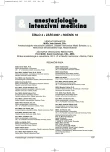Notes on the pathophysiology of postoperative delirium
Poznámky k patofyziologii pooperačního deliria
Pooperační delirium je závažná komplikace, která se vyskytuje po větších chirurgických výkonech. Pro pacienty představuje intenzivní nepříjemný prožitek, zvyšuje jejich mortalitu i výskyt dalších pooperačních komplikací a zanechává dlouhodobý kognitivní deficit. Delirium tak představuje problém ošetřovatelský, terapeutický i ekonomický. Článek shrnuje základní charakteristiky pooperačního deliria, popisuje jeho výskyt a předkládá dosud publikované teorie jeho vzniku.
Klíčová slova:
pooperační delirium – halucinace – kongnitivní deficit
Authors:
M. Hála
Authors‘ workplace:
Centrum kardiovaskulární a transplantační chirurgie, Brno
Published in:
Anest. intenziv. Med., 18, 2007, č. 4, s. 221-226
Category:
Anaesthesiology - Comprehensive Report
Overview
Postoperative delirium represents a serious complication after major surgery. Patients suffer from anxiety, hallucinations and delusions and have higher postoperative morbidity and mortality. A long-term cognitive impairment is its common consequence. Delirium thus represents a nursing, therapeutic as well as economic problem. In this review article the basic characteristics and incidence of postoperative delirium are summarized, and hypotheses of its development published so far are presented.
Key words:
postoperative delirium – hallucination – cognitive impairment
Labels
Anaesthesiology, Resuscitation and Inten Intensive Care MedicineArticle was published in
Anaesthesiology and Intensive Care Medicine

2007 Issue 4
-
All articles in this issue
- Anaesthesia options in carotid endarterectomy
- Influence of low dose ketamine on anaesthesia for bronchoscopic procedures
- Single-shot paravertebral block in children – the initial experience
- Notes on the pathophysiology of postoperative delirium
- One-year experience with the Centralized Intensive Care Unit of the Department of Anaesthesiology and Intensive Care Medicine in Brno
- Non-invasive optical methods for microcirculatory assessment in experiment and in clinical practice: Orthogonal polarization spectral (OPS) imaging and Sidestream dark-field (SDF) imaging
- Non-heart-beating donors
- The First Registered Anaesthetic Nurse in Czechoslovakia: D. S. Alena Stárková-Palečková
- The early days of ether anaesthesia in Moravia in February 1847
- History of anaesthesiology and intensive care in the University Children’s Hospital in BrnoČerné Pole
- Anaesthesiology and Intensive Care Medicine
- Journal archive
- Current issue
- About the journal
Most read in this issue
- Non-heart-beating donors
- The First Registered Anaesthetic Nurse in Czechoslovakia: D. S. Alena Stárková-Palečková
- Notes on the pathophysiology of postoperative delirium
- The early days of ether anaesthesia in Moravia in February 1847
